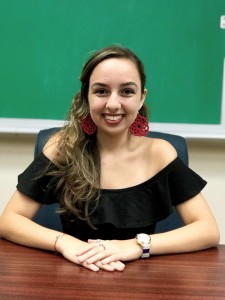[special_text tagname=”h1″ pattern=”no” color=”” font_size=”20″ font_weight=”300″ font=”default” margin_top=”” margin_bottom=”” align=”center”]Recently, Amanda Anqueira-González, a scholarship holder of the Program “Neuroscience Research Opportunities to Increase Diversity” (NeuroID) and student of Bachelor’s degree in Molecular Cell Biology of the Faculty of Natural Sciences was selected from thousands of undergraduate research students at the level of all summer programs sponsored by the National Science Foundation (NSF) to present her research findings at the 2019 Research Experiences for Undergraduate Symposium (REUS). The research symposium will be held October 27-28, 2019 in Alexandria, Virginia. During the past summer and under the successful mentoring of Dr. Eric Klann and Dr. Megan K. Elder of the Center for Neuronal Sciences (CNS) of New York University (NYU), Amanda conducted experiments focused on studying the structure and function of neuronal mitochondria in the etiology of a rare intellectual disability disease known as MEHMO syndrome (Mental retardation, Epileptic seizures, Hypogonadism and genitalism, Microcephaly, Obesity). Amanda’s work entitled: “Investigating mitochondrial structure and function in the rare X-linked intellectual disability disorder, MEHMO Syndrome” was selected for this symposium since it contributes significantly to develop new treatments for this rare disease.
The directors of Summer program at NYU, Dr. Chiye Aoki and Dr. Margarita Kaplow recognized in Amanda her excellent scientific performance in addition to her qualities in responsibility, determination and enthusiasm for research in Neurosciences. Currently, Amanda is in her second year as a scholarship from NeuroID program where she conducts studies on the effects of alcohol on Molecular genetics of the brain using the animal model of Drosophila melanogaster in the laboratory of Dr. Alfredo Ghezzi of the Department of Biology in the Faculty of Natural Sciences. For the past 10 years, the NeuroID Program funded by the National Institutes of Health (NIH) and currently directed by neuroscientists Dr. José E. García Arrarás and Dr. Carmen S. Maldonado-Vlaar has successfully trained almost a hundred undergraduate students in research in the field of Neurosciences from several universities in Puerto Rico. It is important highlight that more than 80% of the graduates of the program continue careers graduates obtaining a PhD degree. in the field of neuroscience. We congratulate Amanda for this recognition and encourage her to continue her Successful scientific trajectory.[/special_text]
